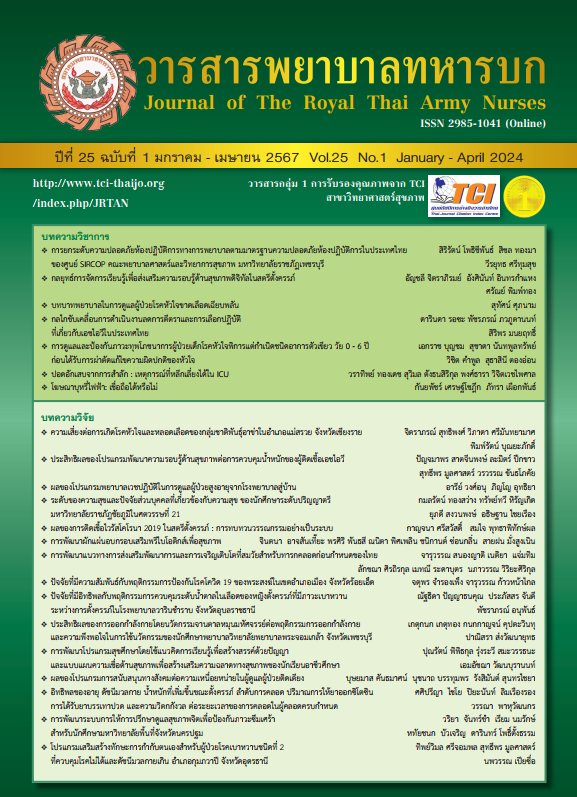The Effects of Using Simulation-Based Learning on Perceptions of the Ability to Provide Ostomy Care. In Adult Nursing Practicum 1
Keywords:
simulation-based learning, nursing practice, preparation nursing practice, nursing studentAbstract
This quasi-experimental research study aimed to examine the effects of using simulation-based learning for the preparation on perceptions of the ability to provide ostomy care in adult nursing practicum 1. The sample group was 40 third-year nursing students. The research instruments were an assessment of the perception of competence in nursing practice, knowledge, and practical skills, and a satisfaction assessment form. The instruments were analyzed for content validity and reliability the index of item-objective congruence was 0.75 - 1.00 the Cronbach’s Alpha Coefficient was 0.85. Data was analyzed by using descriptive statistics, percentage, mean, and standard deviation, and paired t-tests. The results found that 1) The mean score of overall nursing practice perception of nursing students after preparation was higher than before preparation and when compared the mean scores perceived ability to practice nursing after studying was higher than before preparing with statistical significance at the .01 (p <.001) 2) Nursing students’ satisfaction with SBL was at the high level when considering each aspect it was found that nursing students was at the highest level of satisfaction with the teaching and learning process.
Downloads
References
Office of the Council of State. Announcement of the Ministry of Education Study Subject: Bachelor’s degree qualification standards Nursing Science. 2017. (in Thai).
Panawatthanapisuit S, Lertlum L, Tanasansutee C. Development of Simulation Scenario Model for Simulation Based Learning. Health Science. 2019; 28(special): 33-41. (in Thai)
Sinthuchai S, Ubolwan K. Fidelity simulation-based learning: implementation to learning and teaching management. Journal of The Royal Thai Army Nurses. 2017; 18(1): 29-38. (in Thai)
Wisawatapnimit P, Suttineam U, Kiatseesakul J. Effect of simulation-based learning model for nursing practicum preparedness for patients with congestive heart failure on students’ satisfaction and self-confidence in learning of the third-year nursing students, Boromarajonani College of Nursing Bangkok. Journal of Health and Nursing Research 2019; 35(2) 224-34. (in Thai).
Chubkhuntod P, Elter P, Gaewgoontol N, Potchana R. Effects of Simulation Based Learning Model on Knowledge, Self-Efficacy and Abilities of Applying Nursing Process Skills during Intrapartum Care of Nursing Students. Journal of Health Science. 2020; 29(6): 1063-72. (in Thai).
Aldhafeeri F, Alosaimi D. Perception of satisfaction and self-confidence with high fidelity simulation among nursing students in government universities. Journal of Education and Practice. 2020; 11(11), 137-49.
Maraphen R, Boonkoum W, Kheovichai K. Effect of a learning instructional by using standardized patients as simulation in home visits. Thai Red Cross Nursing Journal. 14(1): 125-39. (in Thai).
Pumpu P, Puriwitthayatira K. Effects of teaching using virtual simulations on preparing nursing students before practicing in mental health and psychiatric nursing practice nursing. Health and Education Journal. 2022; 5(3): 37–46. (in Thai).
Jamjang S, Yomdit V, Pongphetdit B, Pitaksin D, Changsieng P, Montong A. Effects of Using Simulation-Based Learning for Preparation of Nursing Practicum on Perceptions of Self efficacy in Performing Nursing Care in a Hospital. Nursing Journal of the Ministry of Public Health. 2017; 27(special): 46-58. (in Thai).
Joyce R, Weil M, Showers B. The effects of cooperative learning experience on eighth grade students’s achievement and attitude toward science. Education. 2010; 131(1): 169-80.
Chatrun C, Phorang R. & Peawnalaw S. The results of teaching and learning management using a simulation-based learning boromarajonani college of nursing, suphanburi. Community health development quarterly KhonKaen University. 2021; 9(2): 207-18. (in thai).
Faculty of Nursing, Ratchathani University Udon Thani Campus Bachelor of Nursing Program updated in 2018. (in Thai).
Thammakijpirote K, Maneewong J, Sanongyard J. Simulation-Based Learning on Critical thinking of Nursing Students in Thailand: A Systematic Review. The Journal of Boromarjonani College of Nursing Suphanburi. 2023; 6(1): 5-28. (in Thai).
Koukourikos K, Tsaloglidou A, Kourkouta L, et al. Simulation in clinical nursing education. Journal of Academy of Medical Sciences. 2021; 29(1): 15-20.
Kapucu S. The effects of using simulation in nursing education: a thorax trauma case scenario. International Journal of Caring Sciences. 2017; 10(2): 1069-74.
Gul P, Halime A, Ayse A, The effect of scenario-based simulation training technology on knowledge and skills of maternity nursing students in Turkey. International Journal of Development Research. 2016; 6(6): 8096-100.
Jamroenwong N, Thanapakawatkul C, Piyarak S, Chaiwong C, Leuchai T. Effects of Using Simulation-based Learning for Perceived Self-efficacy and Outcome Expectations in Performing Hospital Nursing Care among Third year Nursing Students in Boromarajonani College of Nursing Chiang Mai. Royal Thai Navy Medical Journal 2022; 41(1): 135-49. (in thai).
Lertlum L, Tanasansutee C, Panawatthanapisuit S, Bumrungsri C. Development of a simulationbased learning model. The Southern College Network. Journal of Nursing and Public Health. 2019; 6(Special): 43-58. (in Thai).
Maneejak N, Yasri, P. Nursing Students’ Perception toward High Fidelity Simulation. PSAKU International Journal of Interdisciplinary Research. 2019; 7(2): 104–11. (in Thai).
Chudjuajeen S, Wutisukpaisan S. Khumsuk W. Simulation Based-Learning: Application of nursing teaching. The Journal of Boromarjonani College of Nursing Suphanburi. 2022; 5(1): 17-31. (in Thai).
Downloads
Published
How to Cite
Issue
Section
License
Copyright (c) 2024 Journal of The Royal Thai Army Nurses

This work is licensed under a Creative Commons Attribution-NonCommercial-NoDerivatives 4.0 International License.
บทความหรือข้อคิดเห็นใดใดที่ปรากฏในวารสารพยาบาลทหารบกเป็นวรรณกรรมของผู้เขียน ซึ่งบรรณาธิการหรือสมาคมพยาบาลทหารบก ไม่จำเป็นต้องเห็นด้วย
บทความที่ได้รับการตีพิมพ์เป็นลิขสิทธิ์ของวารสารพยาบาลทหารบก
The ideas and opinions expressed in the Journal of The Royal Thai Army Nurses are those of the authors and not necessarily those
of the editor or Royal Thai Army Nurses Association.






